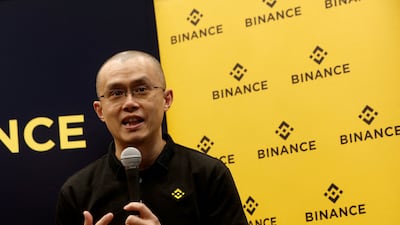The US partner of global cryptocurrency exchange Binance has confirmed that a trading firm managed by Binance chief executive Changpeng Zhao operated as a market maker on its platform.
Reuters reported on Thursday, quoting banking records and company messages, that Binance had secret access to a bank account belonging to its purportedly independent US partner and transferred large sums of money from the account to the trading firm, Merit Peak.
“While there was a market making firm named Merit Peak that operated on the Binance.US platform, it stopped all activity on the platform in 2021,” Binance.US said in a tweet on Thursday after the Reuters story was published.
It did not elaborate on when in 2021 the activity ceased, or comment on Mr Zhao's role at the trading firm.
The global Binance exchange is not licensed to operate in the US, but the transfers to Merit Peak revealed by Reuters suggest that Binance controlled the finances of Binance. US, despite saying publicly that the American entity is “fully independent” and operates as its “US partner”.
Binance transferred more than $400 million from the account at California-based Silvergate Bank to Merit Peak between January and March of 2021, Reuters reported on Thursday.
Before that story was published, Binance.US told Reuters that, “Merit Peak is neither trading nor providing any kind of services on the Binance.US platform.” It did not elaborate.
Binance.US executives were concerned by the outflows from the Silvergate account to Merit Peak because the transfers were taking place without their knowledge, according to company messages reviewed by Reuters.
A representative of the global Binance exchange, which did not respond to Reuters' questions for the story on Thursday, told cryptocurrency news outlet CoinDesk that the transfers were “a Binance.US issue”.
Mr Zhao said on Friday that the global exchange has pulled back on potential investments in the US, a move that comes amid growing scrutiny by US regulators of cryptocurrency companies so far this year.
In particular, the activities of cryptocurrency platforms' market makers — those that typically buy and sell assets at exchanges to deepen trading volumes — have drawn regulatory and political focus since the collapse of major exchange FTX in November.
Regulators are concerned that some market makers have received undisclosed special treatment from cryptocurrency exchanges that may disadvantage customers.
The US Securities and Exchange Commission accused FTX founder Sam Bankman-Fried in December of granting “special privileges” to his trading firm Alameda Research, allowing him to siphon off billions of dollars in FTX customer money. Mr Bankman-Fried has pleaded not guilty.
“Something fishy is going on here that clearly doesn't pass the smell test,” US Senator Roger Marshall told Reuters. “Congress needs answers, and Binance. US and Silvergate are obligated to give them to us.”
US Senator
Mr Zhao has not directly addressed the report, but on Friday he tweeted, “Remember 4.,” tagging a previous post in which he listed his Do's and Don'ts for 2023. The fourth item on the list was “Ignore FUD, fake news, attacks,” using an acronym for “fear, uncertainty and doubt” often used in cryptocurrency in relation to news perceived as negative.
The day before Reuters' article, Binance's chief strategy officer, Patrick Hillmann, told the Wall Street Journal and Bloomberg that Binance expected to pay penalties to resolve US investigations into the company.
Mr Hillmann said Binance had been built by software engineers unfamiliar with laws and rules on bribery and corruption, money laundering and economic sanctions, but earlier “gaps” in its regulatory compliance had since been closed.
“It's a tremendous burden,” he told Bloomberg. “We just want to put it behind us.”
Mr Hillmann did not respond to detailed questions Reuters sent him for the article that was published on Thursday.
The bankruptcy in 2022 of a string of major cryptocurrency firms has amplified calls from politicians for greater clarity on how regulators assess ties between US banking and the cryptocurrency sector.

